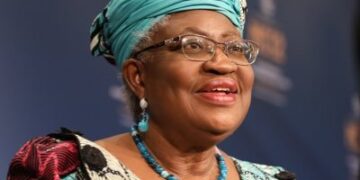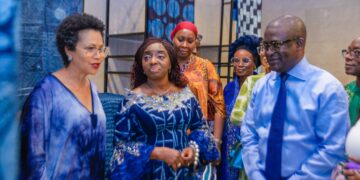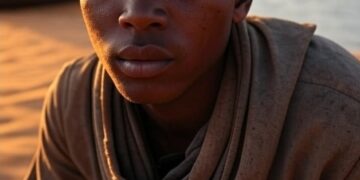The final was a rollercoaster of emotions for fans and stakeholders alike. Morocco, buoyed by a passionate home crowd and led by tournament top-scorer Ghizlane Chebbak, surged to a commanding 2-0 lead by halftime, with goals in the 24th minute and earlier. The Atlas Lionesses’ attacking flair, backed by coach Jorge Vilda’s World Cup-winning experience, put Nigeria on the back foot. However, the Super Falcons, under the guidance of interim coach Justin Madugu, mounted an extraordinary second-half comeback.
The fightback began in the 64th minute when Nigeria pulled one back, igniting hope among the team and supporters. Seven minutes later, Folashade Ijamilusi leveled the score at 2-2, capitalizing on a well-executed move. The decisive moment came in the 88th minute when substitute Jennifer Echegini scored a stunning goal, putting Nigeria ahead for the first time. Despite six minutes of stoppage time and a tense VAR check for a potential Moroccan penalty in the 84th minute, the Super Falcons held firm to secure a 3-2 victory, silencing the Rabat crowd and sparking jubilant celebration.
Captain Rasheedat Ajibade, who earned three Woman of the Match awards during the tournament, was instrumental in Nigeria’s success, leading with poise and creativity. The defensive unit, featuring Michelle Alozie, Osinachi Ohale, Tosin Demehin, and Ashleigh Plumptre, conceded just one goal—a penalty—across the entire tournament, with goalkeeper Chiamaka Nnadozie proving virtually unbeatable. Esther Okoronkwo’s intelligent play and four assists highlighted Nigeria’s attacking depth, with eight different players contributing goals throughout the campaign.
Coach Madugu’s tactical adjustments in the second half, including strategic substitutions and a shift to exploit Morocco’s defensive vulnerabilities, were pivotal. Nigeria’s ability to adapt under pressure underscored its championship pedigree, having never lost a WAFCON final in nine previous appearances. This victory holds profound implications for stakeholders in Nigerian football and beyond.
The triumph validates the NFF’s investment in the Super Falcons, particularly under Madugu’s interim leadership following Randy Waldrum’s departure. The team’s success, built around a core of home-based talent, signals a positive shift as Nigeria rebuilds for future competitions, including the 2027 FIFA Women’s World Cup qualifiers.
The win enhances the global profiles of players like Ajibade, Nnadozie, and Alozie, who play for top clubs in Europe and the U.S. It also solidifies Madugu’s case for a permanent role, showcasing his ability to deliver under pressure. The Super Falcons’ dominance, coupled with the tournament’s record $1 million prize money, highlights the growing commercial potential of women’s football in Africa. Brands associated with the team stand to benefit from increased visibility and fan engagement.
The victory unites Nigerians in celebration, reinforcing the Super Falcons’ role as a source of national pride. Social media buzz around “Mission X” reflects the team’s cultural impact, with fans lauding their resilience against a formidable host nation.
Nigeria’s success sets a benchmark for professionalism and competitiveness, challenging other nations to elevate their programs. Morocco’s impressive campaign, reaching their second consecutive final, also underscores the rapid growth of women’s football in North Africa, fueled by significant investment.
The victory was especially sweet for Nigeria, which sought redemption after losing to Morocco on penalties in the 2022 WAFCON semifinals, a match marred by controversial officiating and crowd hostility. The Super Falcons’ ability to overcome a 2-0 deficit in Rabat, despite similar challenges with home-crowd pressure, demonstrated mental fortitude and a commitment to protecting their unbeaten record in WAFCON finals.
As Nigeria celebrates this milestone, stakeholders must capitalize on the momentum. The NFF should prioritize sustained investment in grassroots women’s football, improved domestic leagues, and preparation for global competitions. For sponsors, this is an opportune moment to deepen partnerships with the Super Falcons, leveraging their unrivaled success to drive brand growth. The team’s next challenge will be maintaining its dominance while nurturing emerging talents to ensure long-term success.
In conclusion, the Super Falcons’ 10th WAFCON title is a testament to their enduring excellence and a clarion call for stakeholders to rally behind women’s football. As the team soars, they carry the hopes of a nation and the promise of a brighter future for the sport in Africa.[](https://creebhills.
On July 26, 2025, Nigeria’s Super Falcons cemented their legacy as Africa’s most dominant women’s football team by clinching a record-extending 10th Women’s Africa Cup of Nations (WAFCON) title in a pulsating 3-2 comeback victory against host nation Morocco at the Prince Moulay Abdellah Olympic Annex Stadium in Rabat. The match, dubbed “Mission X” by the Nigerian squad, showcased resilience, tactical brilliance, and sheer determination, delivering a historic moment for Nigerian football and a significant milestone for women’s sports in Africa.
The final was a rollercoaster of emotions for fans and stakeholders alike. Morocco, buoyed by a passionate home crowd and led by tournament top-scorer Ghizlane Chebbak, surged to a commanding 2-0 lead by halftime, with goals in the 24th minute and earlier. The Atlas Lionesses’ attacking flair, backed by coach Jorge Vilda’s World Cup-winning experience, put Nigeria on the back foot. However, the Super Falcons, under the guidance of interim coach Justin Madugu, mounted an extraordinary second-half comeback.
The fightback began in the 64th minute when Nigeria pulled one back, igniting hope among the team and supporters. Seven minutes later, Folashade Ijamilusi leveled the score at 2-2, capitalizing on a well-executed move. The decisive moment came in the 88th minute when substitute Jennifer Echegini scored a stunning goal, putting Nigeria ahead for the first time. Despite six minutes of stoppage time and a tense VAR check for a potential Moroccan penalty in the 84th minute, the Super Falcons held firm to secure a 3-2 victory, silencing the Rabat crowd and sparking jubilant celebration.
Captain Rasheedat Ajibade, who earned three Woman of the Match awards during the tournament, was instrumental in Nigeria’s success, leading with poise and creativity. The defensive unit, featuring Michelle Alozie, Osinachi Ohale, Tosin Demehin, and Ashleigh Plumptre, conceded just one goal—a penalty—across the entire tournament, with goalkeeper Chiamaka Nnadozie proving virtually unbeatable. Esther Okoronkwo’s intelligent play and four assists highlighted Nigeria’s attacking depth, with eight different players contributing goals throughout the campaign.
Coach Madugu’s tactical adjustments in the second half, including strategic substitutions and a shift to exploit Morocco’s defensive vulnerabilities, were pivotal. Nigeria’s ability to adapt under pressure underscored its championship pedigree, having never lost a WAFCON final in nine previous appearances. This victory holds profound implications for stakeholders in Nigerian football and beyond.
The triumph validates the NFF’s investment in the Super Falcons, particularly under Madugu’s interim leadership following Randy Waldrum’s departure. The team’s success, built around a core of home-based talent, signals a positive shift as Nigeria rebuilds for future competitions, including the 2027 FIFA Women’s World Cup qualifiers.
The win enhances the global profiles of players like Ajibade, Nnadozie, and Alozie, who play for top clubs in Europe and the U.S. It also solidifies Madugu’s case for a permanent role, showcasing his ability to deliver under pressure. The Super Falcons’ dominance, coupled with the tournament’s record $1 million prize money, highlights the growing commercial potential of women’s football in Africa. Brands associated with the team stand to benefit from increased visibility and fan engagement.
The victory unites Nigerians in celebration, reinforcing the Super Falcons’ role as a source of national pride. Social media buzz around “Mission X” reflects the team’s cultural impact, with fans lauding their resilience against a formidable host nation.
Nigeria’s success sets a benchmark for professionalism and competitiveness, challenging other nations to elevate their programs. Morocco’s impressive campaign, reaching their second consecutive final, also underscores the rapid growth of women’s football in North Africa, fueled by significant investment.
The victory was especially sweet for Nigeria, which sought redemption after losing to Morocco on penalties in the 2022 WAFCON semifinals, a match marred by controversial officiating and crowd hostility. The Super Falcons’ ability to overcome a 2-0 deficit in Rabat, despite similar challenges with home-crowd pressure, demonstrated mental fortitude and a commitment to protecting their unbeaten record in WAFCON finals.
As Nigeria celebrates this milestone, stakeholders must capitalize on the momentum. The NFF should prioritize sustained investment in grassroots women’s football, improved domestic leagues, and preparation for global competitions. For sponsors, this is an opportune moment to deepen partnerships with the Super Falcons, leveraging their unrivaled success to drive brand growth. The team’s next challenge will be maintaining its dominance while nurturing emerging talents to ensure long-term success.
In conclusion, the Super Falcons’ 10th WAFCON title is a testament to their enduring excellence and a clarion call for stakeholders to rally behind women’s football. As the team soars, they carry the hopes of a nation and the promise of a brighter future for the sport in Africa.[](https://creebhills.









































